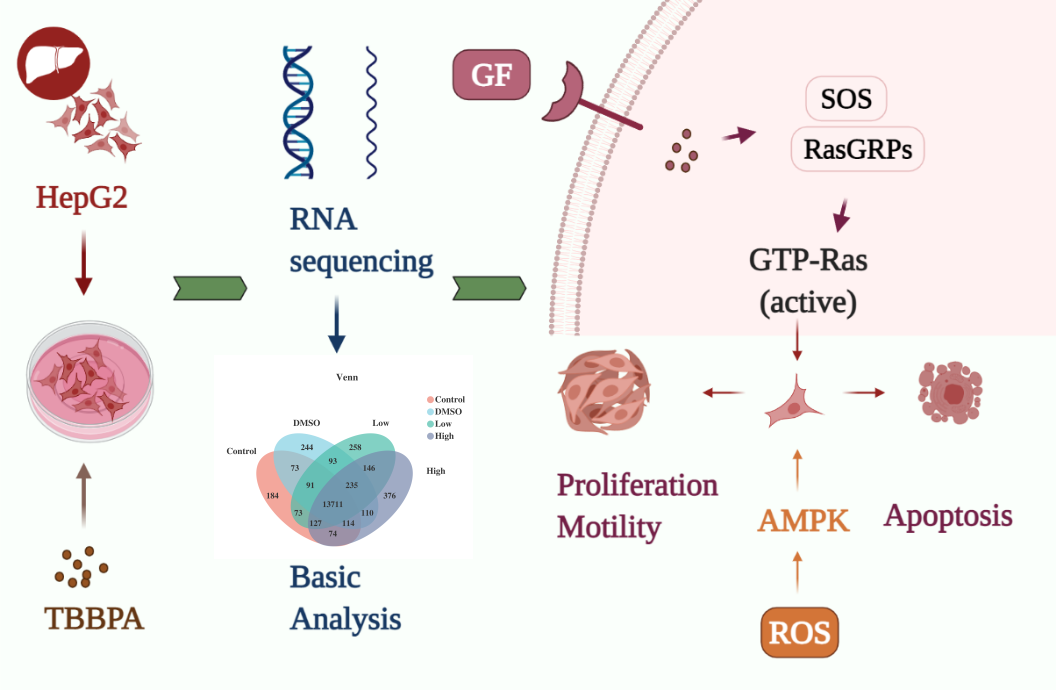近日,广东工业大学环境健康与污染控制研究院、环境科学与工程学院安太成教授团队的题为《Low concentration Tetrabromobisphenol A (TBBPA) elevating overall metabolism by inducing activation of the Ras signaling pathway》的学术论文在Journal of Hazardous Materials(JHM,DOI:10.1016/j.jhazmat.2021.125797)杂志上发表。论文的第一作者为硕士研究生卢莉蓉,通讯作者为安太成教授。
溴代阻燃剂(BFR)作为添加剂广泛应用于塑料、纺织品、电子电器设备、电灯插座、水管、保温棉等商用产品的生产过程中,其中四溴双酚A (TBBPA)是最常见的典型阻燃剂之一,占据了溴代阻燃剂市场的60%。在电子工业的空气样品、河流沉积物和污水污泥样品中都有四溴双酚A的检出。更甚者,TBBPA能在孕妇和哺乳妇女的血清、脐血和母乳中积累,并导致婴儿血清中检出TBBPA浓度的增加,TBBPA在职业暴露人员体内的检出浓度也比普通人群高,因此,开展TBBPA的暴露对于电子垃圾拆解从业工人的潜在健康风险的研究是十分必要的。
在这项研究中,我们通过采用人体血浆中水平的TBBPA浓度来开展细胞暴露实验,分析TBBPA的长期暴露对职业人群可能造成的健康风险。主要通过职业人群水平下的低浓度TBBPA的长期暴露细胞生理效应研究,分析细胞转录组受TBBPA暴露干扰下的差异表达基因,开展了通路验证与机制分析,从细胞生理水平和基因表达调控水平评估TBBPA长期暴露对HepG2细胞的致毒损伤机制。研究结果表明:长期暴露低浓度TBBPA,显著促进了HepG2细胞的增殖,使线粒体释放的活性氧(ROS)水平增加1倍,协同诱导腺苷单磷酸活化蛋白激酶(AMPK)基因表达水平上调,促进细胞增殖。然而ROS也可以通过线粒体膜电位(MMP)介导细胞凋亡过程。通过RNA-seq实验分析,证实了Ras信号通路被生长因子激活,从而可能介导细胞解毒机制,同时提高了脂质和维生素代谢率,揭示了低浓度TBBPA诱导Ras信号通路激活的机制,并显示了血浆浓度下TBBPA暴露后人肝细胞潜在的代谢紊乱。
Graphical Abstract

论文DOI:10.1016/j.jhazmat.2021.125797
论文英文摘要:
Tetrabromobisphenol A (TBBPA) is one of the most common flame retardants that affect the neurodevelopment, disrupt the endocrine system and increase the possibility of tumorigenesis. In this study, cell exposure was measured by mimicking the residual TBBPA concentrations in human plasma, especially at occupational populations. We mainly focused on clarifying the cytotoxic effects, genetic effects, metabolic effects and its correlation induced activation at low concentration TBBPA exposure with the occupational population level. Our results revealed that long term TBBPA exposure especially at 1 nM significantly promoted the proliferation of HepG2 cells. Furthermore, long term TBBPA exposure can double the level of reactive oxygen species (ROS) released from mitochondria, therefore increased adenosine monophosphate activated protein kinase (AMPK) gene expression level to promote cellular proliferation. However, ROS can also mediate apoptosis process through the mitochondrial membrane potential (MMP). After RNA-seq analysis, it is confirmed that Ras signaling pathway was activated by the growth factor to mediate cell detoxification mechanism, meanwhile increased lipid and vitamin metabolic rate. In summary, our work uncovers a mechanism by which low concentration TBBPA induce the activation of Ras signaling pathway and demonstrates potential metabolic disorder in human hepatic cell upon the plasma TBBPA exposure.